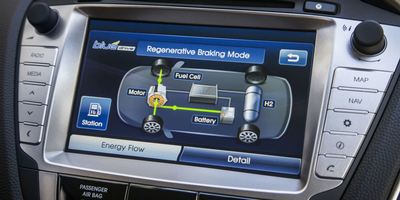Hyundai BELIEVES In Future Of Fuel-Cells For Automobile Power - Put's Money Where Mouth Is
BINGE - Read MORE About It:
Fuel-Cells and Hydrogen For Mobility Power Content Library (1995-Present)
- Hyundai to invest in Impact Coatings, H2Pro and GRZ Technologies for fuel cell, hydrogen production, and hydrogen storage technologies
- Cummins has made a memo of understanding with Hyundai Motor Company to collaborate on hydrogen fuel cell technology across commercial markets in North America
- The investments will strengthen Hyundai’s hydrogen leadership with expanded infrastructure and efficient FCEV manufacturing
SEOUL, October 29, 2019 — Hyundai Motor Company announced key investments into three hydrogen companies – Impact Coatings, H2Pro and GRZ Technologies – to strengthen its leadership position in the global hydrogen fuel cell ecosystem.
The strategic investments come at a time of heightened demand for fuel cell technology. The collaboration with industry leading players will enable Hyundai to expand its hydrogen infrastructure and enhance the efficiency of its fuel cell electric vehicle (FCEV) manufacturing.
“Our investment in these innovative companies will reduce the production cost of FCEVs and enhance the safety and affordability of hydrogen infrastructure,” said Youngcho Chi, President and Chief Innovation Officer at Hyundai Motor Group. “We hope to accelerate the widespread adoption of hydrogen technology by making FCEVs more accessible for our customers.”
Impact Coatings
Impact Coatings AB is a leading supplier of PVD[1]-based coating solutions for fuel cells, offering coating materials, machines, and services. The Swedish company’s ceramic coatings are cost-efficient substitutes for precious metals used in fuel cell production. Under the new joint development agreement, Hyundai and Impact Coatings will jointly research and develop a new generation of materials, processes and equipment for a variety of applications, including fuel cells and hydrogen production.
[1] Physical Vapor Deposition
H2Pro
H2Pro is an Israeli startup that developed the E-TAC (electrochemical, thermally active chemical) water splitting technology, which is efficient, affordable, and safe. H2Pro’s technology will allow Hyundai to lower the cost of hydrogen production, which will in turn reduce the price of hydrogen for customers. This marks Hyundai’s second investment into the startup since Hyundai CRADLE Tel Aviv first announced the partnership in November 2018.
GRZ Technologies
GRZ Technologies is a company based in Switzerland specializing in energy storage in hydrogen form. Its technology stores hydrogen more safely at lower pressure with higher density, while its proprietary compression technology is also more affordable. Hyundai’s agreement with GRZ will accelerate the company’s efforts to commercialize hydrogen infrastructure for greater accessibility to customers.
Hyundai Motor is a world leader in the development of hydrogen fuel cell technology. It became the world’s first automaker to commercialize fuel-cell electric vehicles with the introduction of ix35 Fuel Cell (also known as Tucson Fuel Cell) in 2013. Hyundai’s second-generation FCEV, the NEXO, has a range of over 609 kilometers and emits clean water vapor and purifies the air while driving.
WHAT’S THE DIFFERENCE BETWEEN FUEL-CELL VEHICLES AND ELECTRIC CARS?
In typical EVs, lithium-ion batteries store electrical energy produced away from the car and use that to power the vehicle. Hydrogen fuel cells use a chemical reaction to produce energy, converting hydrogen stored in the vehicle into electricity, while emitting only water vapor. Hydrogen’s superior energy-to-weight ratio over a lithium-ion battery lends itself to longer trips.
Despite the backing of industry giants such as Toyota Motor Corp. and the benefits of fuel-cell vehicles -- they refuel faster and are more suitable for driving long distances than all-electric vehicles -- the technology hasn’t caught on amid expensive prices.
But China has the muscle to change all that should it make hydrogen-powered vehicles a national priority -- the type of turning point the industry has been waiting decades for.



